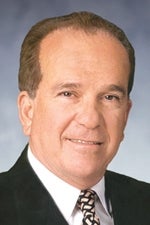The merger between Framingham-based Perini Corp. and California-based Tutor-Saliba Corp. has not only turned two good-sized construction companies into one bigger, stronger firm, but Perini’s CEO Ron Tutor is now wealthier by half a billion dollars, at least on paper.
And while Perini’s board may be pleased that they get to keep the well-connected Tutor at the helm of the aggressive firm, the deal has prompted a class-action lawsuit on behalf of shareholders.
Dollar Details
Ron Tutor owned Tutor-Saliba while he piloted Perini Corp. as its CEO beginning in 2000. In 1997 and then again in 2000, Tutor, in conjunction with other investors, provided approximately $70 million to help keep Perini solvent.
“He saved Perini and we have undivided loyalty toward him,” said Robert Band, Perini Corp.’s president and chief operating officer, who has been with Perini since 1973. “His reasoning on that investment was because when his company was small, we helped him out. The two companies have done $3.5 billion in projects for 35 years before the merger.”
The merger between Perini and Tutor-Saliba was an all-stock transaction that was completed on Sept. 8, when Perini Corp. shareholders voted to buy out the shareholders of Tutor-Saliba. Tutor owned 96 percent of the private firm.
The class action suit, which was filed in Massachusetts Superior Court in June, alleges that Perini directors agreed to a share exchange ratio that was unfair to Perini shareholders and that the merger proxy statement filed with the SEC did not adequately disclose information about the proposed transaction.
The numbers of the deal appear to work out favorably for Ron Tutor, who received Perini stock worth, on the current market, approximately $540 million. However, the purchase agreement prevents Tutor from selling any stock for six months and he must hold on to 70 percent of it for at least five years, meaning its value may decrease — or increase — over time.
The deal also let Tutor-Saliba pay out $48 million in cash to its shareholders as dividends, of which Tutor’s share was about $45.7 million. Tutor-Saliba also had $25 million in real estate, which was not part of the merger, according to Band.
The impetus for the merger — announced this past April — was Tutor’s planned resignation from Perini Corp. He told the company’s board of directors in the fall of 2007 that he wanted to resign to focus solely on taking Tutor-Saliba public.
His announcement — and sell off of $130 million in Perini shares — led directors to ask him to merge his company with Perini and stay on as head of the company, according to SEC documents.
One change that may eventually come about due to the merger is a move of Perini’s corporate headquarters, Band said. Currently based in Framingham, the company is considering moving its HQ to Los Angeles or Las Vegas. Los Angeles has an edge because Tutor is based there, he said.
If the headquarters are moved, the Framingham location at 73 Mt. Wayte Ave. will be a regional office for the company’s international and Eastern U.S. divisions, Band said.
The combined company now has a $9 billion backlog of projects and more than $40 billion in targeted projects. In 2007, Perini reported $4.6 billion revenues, and $2.65 billion in revenues for the first half of 2008.
Avram Fisher, an analyst with BMO Capital Markets Corp. of New York, wrote in a recent report that the Tutor-Perini deal was a case of the directors chasing Tutor, perhaps too amorously.
“This deal was largely assembled by PCR’s (Perini’s) board and the valuation implies strong efforts to woo Ron Tutor. Given PCR’s bigger balance sheet and larger backlog, we believe PCR shareholders should have been wooed and not made to woo,” he wrote.
But Richard Paget, an analyst for Morgan Joseph & Co. of New York said the combined company will be able to go after projects that are “bigger in scope and scale.”
What Happens In Vegas
Perini’s already playing on a large stage. The company was awarded $3 billion of a $6 billion, contract to build Project City Center in Las Vegas, one of the biggest developments in the country. It is working on projects around the country, as well as overseas in Iraq and Guam and plans to expand in the Middle Eastern nation of Dubai.
Part of Tutor’s allure for the Perini board was his connections in Las Vegas, according to Paget.
“Good relationships are especially important in Las Vegas. Losing a good figurehead like Ron Tutor would be a net negative to the company. If they keep him through the merger, then the two companies become stronger together,” he said.
Despite the lawsuit and questions about who profited most in the merger, the companies or Ron Tutor himself, it would seem that going forward the company and its CEO interests are aligned.
As Fisher points out, Tutor now owns 43 percent of Perini Corp. and his and the company’s interests are intrinsically linked.

